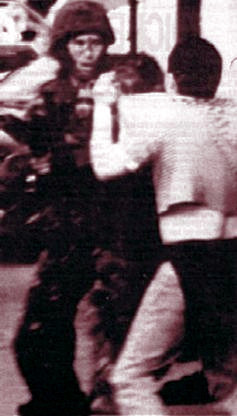
The Qibya massacre occurred during Operation Shoshana, a reprisal operation that occurred in October 1953 when Israeli troops under Ariel Sharon attacked the village of Qibya in the West Bank, which was then under Jordan's control, and killed Palestinian civilians.
Aid to the Civil Power (ACP) or Military Aid to the Civil Power (MACP) is the use of the armed forces in support of the civil authorities of a state. Different countries have varying policies regarding the relationship between their military and civil authorities.

The International Security Assistance Force (ISAF) was a multinational military mission in Afghanistan from 2001 to 2014. It was established by United Nations Security Council Resolution 1386 pursuant to the Bonn Agreement, which outlined the establishment of a permanent Afghan government following the U.S. invasion in October 2001. ISAF's primary goal was to train the Afghan National Security Forces (ANSF) and assist Afghanistan in rebuilding key government institutions; it gradually took part in the broader war in Afghanistan against the Taliban insurgency.

Airport security includes the techniques and methods used in an attempt to protect passengers, staff, aircraft, and airport property from malicious harm, crime, terrorism, and other threats.

The Kosovo Force (KFOR) is a NATO-led international peacekeeping force in Kosovo. Its operations are gradually reducing until Kosovo's Security Force, established in 2009, becomes self-sufficient.

The United Nations Organization Stabilization Mission in the Democratic Republic of the Congo or MONUSCO, an acronym based on its French name Mission de l'Organisation des Nations Unies pour la stabilisation en République démocratique du Congo, is a United Nations peacekeeping force in the Democratic Republic of the Congo (DRC) which was established by the United Nations Security Council in resolutions 1279 (1999) and 1291 (2000) to monitor the peace process of the Second Congo War, though much of its focus subsequently turned to the Ituri conflict, the Kivu conflict and the Dongo conflict. The mission was known as the United Nations Mission in the Democratic Republic of Congo or MONUC, an acronym of its French name Mission de l'Organisation des Nations Unies en République démocratique du Congo, until 2010.

The Multi-National Force – Iraq (MNF–I), often referred to as the Coalition forces, was a military command during the 2003 invasion of Iraq and much of the ensuing Iraq War, led by the United States of America, United Kingdom, Australia, Italy, Spain and Poland, responsible for conducting and handling military operations.

Following the terrorist attacks of September 11, 2001, several nations took on Al-Qaeda and the Taliban during Operation Enduring Freedom (OEF) in Afghanistan. OEF was the initial combat operations starting on 7 October 2001, in the wake of the 11 September attacks on the United States, and during 2002 and 2003.

The Republican Guard of the Democratic Republic of the Congo, formerly known as the Special Presidential Security Group, is maintained by President Félix Tshisekedi. Military of the Democratic Republic of the Congo (FARDC) military officials state that the Garde Républicaine is not the responsibility of FARDC, but the Head of State. Apart from Article 140 of the Law on the Army and Defence, no legal stipulation on the DRC's Armed Forces makes provision for the GR as a distinct unit within the national army. In February 2005, President Joseph Kabila passed a decree which appointed the GR's commanding officer and 'repealed any previous provisions contrary' to that decree. The GR is more than 10,000 strong, and formerly consisted of three brigades, the 10th, at Kinshasa, the 15th, and the 16th, at Lubumbashi. It has better working conditions and is paid regularly, but still commits numerous crimes near their bases, including against United Nations officials.

The 1992 Coalisland riots were a series of clashes on 12 and 17 May 1992 between local Irish nationalist civilians and British Army soldiers in the town of Coalisland, County Tyrone, Northern Ireland. The Third Battalion 1992 tour's codename was "Operation Gypsy".

The Boston Marathon bombing was a domestic terrorist attack that took place during the annual Boston Marathon on April 15, 2013. Brothers Dzhokhar and Tamerlan Tsarnaev planted two homemade pressure cooker bombs that detonated near the finish line of the race 14 seconds and 210 yards (190 m) apart. Three people were killed and hundreds injured, including 17 who lost limbs.

An internal conflict in the Central African Republic (CAR) started essentially on 13 April 2013, when the government of President Michel Djotodia officially took over. The fighting was between the government of the Central African Republic's former Séléka coalition of rebel groups, who are mainly from the Muslim minority, and the mainly Christian anti-balaka coalition. The conflict was part of the ongoing Central African Republic Civil War (2012–present). International organisations, such as the United Nations, had warned of a possible genocide. UNSC resolution 2122 authorised the African-led International Support Mission to the Central African Republic (MISCA) to be deployed to the country, and France to lead operations with additional troops sent to bolster its force in the country. Following a summit of Economic Community of Central African States (CEEAC), including the attendance of all the country's MPs, Djotodia resigned from the presidency on 10 January 2014. The National Transitional Council chose Bangui mayor Catherine Samba-Panza as interim president on 20 January 2014. A period of lawlessness prevailed during the early days of her presidency with people moving into religiously cleansed neighbourhoods as the UN warned of a genocide. Anti-Balaka attacks continued against Muslim civilians.

The 2014 Boston Marathon took place in Boston, Massachusetts, on Monday, April 21. It was the 118th official running of the Boston Marathon, traditionally held on Patriots' Day. The race is organized by the Boston Athletic Association, and has been happening yearly since 1897. On account of the 2013 Boston Marathon bombings, extra security measures were implemented. They started a safety committee which began meeting in January of each year, as well as had a multi-agency coordination center to provide a place for people to go who were in need of help during the course of the race. New laws included the Post Disaster Mental Health Act were implemented which provides mental health services for places after a disaster even if it is not considered extreme enough to be a Major Disaster. The 2014 Marathon had about 36,000 registered participants, second only to the 1996 race in number of entries.

The Timeline of the War in Iraq covers the War in Iraq, a war which erupted that lasted in Iraq from 2013 to 2017, during the first year of armed conflict.
The IS insurgency in Tunisia refers to the ongoing militant and terror activity of the Islamic State branch in Tunisia. The activity of the Islamic State (IS) in Tunisia began in June 2015, with the Sousse attacks, though an earlier terror incident in Bardo Museum in March 2015 was claimed by ISIL, while the Tunisian government blamed Okba Ibn Nafaa Brigade for the attack. Following massive border clashes near Ben Guerdane in March 2016, the activity of the IS group was described as an armed insurgency, switching from previous tactics of sporadic suicide attacks to attempts to gain territorial control.
Belgium is a European country with a Jewish population of approximately 35,000 out of a total population of about 11.4 million. It is among the countries experiencing an increase in both antisemitic attitudes and in physical attacks on Jews.

Opération Sentinelle is an ongoing French military operation with 10,000 soldiers and 4,700 police and gendarmes deployed since the aftermath of the January 2015 Île-de-France attacks, with the objective of protecting the deemed sensitive "points" of the territory from terrorism. It was reinforced during the November 2015 Paris attacks, and is part of a state of emergency in France due to continued terror threats and attacks, until the state of emergency ended on 1 November 2017. On 13 October 2023, France raised its security alert to the highest level, and the day after it deployed 7,000 soldiers following the Arras school stabbing.
On 3 February 2015, three soldiers, guarding a Jewish community center in Nice, France, were attacked with a knife by Moussa Coulibaly, a lone-wolf terrorist.
Operation Temperer is a British government plan to deploy troops to support and free up police officers in key locations following a major terrorist attack or major public disorder. It was put into effect for the first time on 22 May 2017 following the bombing of an Ariana Grande concert at Manchester Arena, and for a second time following the Parsons Green bombing.

On 20 June 2017, a terrorist bomb caused a small explosion at Brussels-Central railway station in Brussels, Belgium; there were no casualties. Soldiers patrolling the station subsequently killed the suspect with three to four shots, according to eyewitnesses. The perpetrator was Oussama Zariouh, a 36-year-old Moroccan national who lived in the Molenbeek municipality and who had assembled a defective explosive device.
















